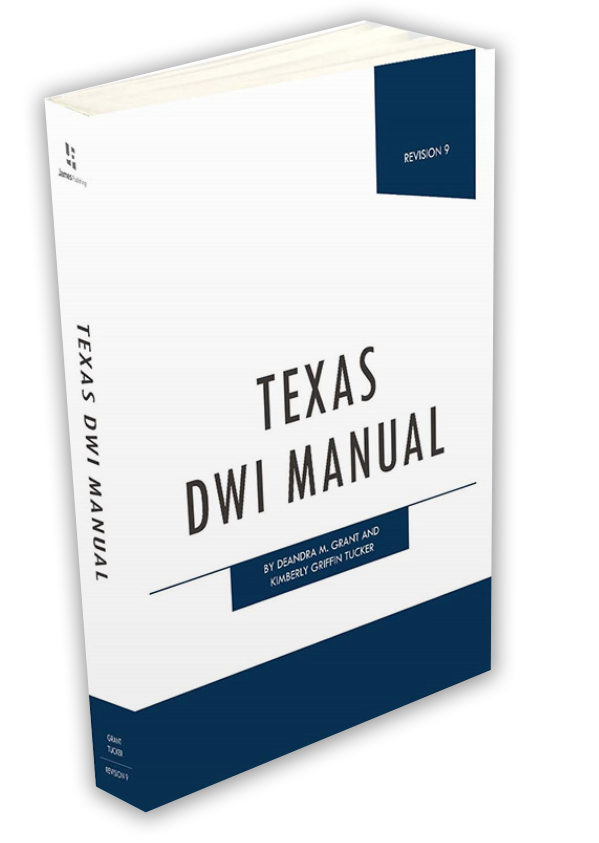Dallas DWI and Criminal Defense Lawyers
With Offices in Dallas, Fort Worth, Allen, Denton, Waco & Austin



"Deandra Grant Law fights hard for their clients and is always willing to go above and beyond. They are the best firm for DWI cases in DFW and beyond. Definitely hire them to represent you in any pending cases."

"Deandra Grant made a tough situation so much better. She listened to my concerns and helped me so much with my case. I would recommend her to anyone needing legal services."

"Deandra Grant Law handled my case with diligence and professionalism. Deandra Grant's reputation is stellar and now I know why. She has a team of individuals who provide quality service."





Since 1994 when our doors opened, Deandra Grant Law has helped thousands of clients get their DWI charges reduced or dismissed. We're ready to fight on your behalf.

Managing Partner
Partner & Criminal Division Chief
Criminal Division Senior Associate
Criminal Division DWI Trial Chief
Immigration Division Chief & Criminal Division Deputy Chief
Criminal Division Associate


Fighting DWI charges can present many challenges, not only for the defense, but prosecutors as well. This is why it is important to be armed with the necessary knowledge so you understand the DWI process.
Attorney Deandra M. Grant is the co-author of the Texas DWI Manual, offering legal advice to both clients and fellow attorneys. Fighting DWI charges can present may challenges, not only for the defense, but prosecutors as well. This is why it is important to be armed with the necessary knowledge so that you understand the DWI criminal process.
Learn MoreIf you find yourself on this page, it’s likely that you or a loved one is dealing with a difficult situation – a DWI or criminal charge in Dallas, TX. At Deandra Grant Law, our Dallas DWI and criminal defense lawyers understand the mix of emotions and uncertainties that come with such circumstances. Rest assured, we’re here to offer our guidance, support, and unwavering commitment to help you navigate this challenging journey.
After being arrested for a DWI (Driving While Intoxicated) or any criminal offense, the stakes are high. Beyond the legal consequences, your reputation, job, and future opportunities could be at risk. This is where having a skilled legal ally becomes paramount – someone who knows the intricacies of the law, the local court system, and has a proven track record of successfully defending clients.
Deandra Grant Law specializes in both DWI defense and criminal defense, boasting a deep understanding of the legal landscape in Texas. With years of experience, our team has helped countless individuals facing a wide range of DWI and criminal charges secure favorable outcomes.
Our firm is well-equipped to handle various DWI charges, including:
BWI (Boating While Intoxicated): If you’re facing charges related to operating a watercraft under the influence, we’re here to provide expert representation.
CDL DWI: For commercial driver’s license holders, a DWI charge can threaten your livelihood. Our attorneys have the knowledge to safeguard your career.
Felony DWI: When DWI charges escalate to felonies due to previous convictions or accidents, our team is prepared to minimize the impact.
Hit and Run DWI: If your DWI incident involves a hit and run, we offer strategic defense strategies tailored to your circumstances.
Multiple DWIs: Facing the heightened penalties of multiple DWI convictions? Count on us to build a robust defense.
Underage DWI: For individuals under the legal drinking age facing DWI charges, our team offers empathetic support and skilled representation.
Our experience goes beyond DWI cases. We offer strong defense strategies for a variety of criminal charges, including but not limited to:
Drug Crimes: Whether it’s possession, distribution, or trafficking of controlled substances, we’re here to protect your rights.
Murder: If you’re accused of homicide, our team is dedicated to preserving your rights and pursuing a just outcome.
Theft and Robbery: Facing charges related to theft or robbery? We provide skilled defense to mitigate the consequences.
White-Collar Crimes: Allegations of financial and white-collar crimes demand sophisticated defense strategies, and that’s precisely what we offer.
At Deandra Grant Law, we recognize the weight of your situation and genuinely care about your future. Each case is approached with empathy, respect, and an unwavering commitment to securing a positive outcome for you. Our Dallas DWI and criminal defense lawyers take the time to comprehend the nuances of your case and work tirelessly to tailor a defense strategy that fits your needs.
You don’t have to face this challenging time alone. Trust Deandra Grant Law to stand by your side, protect your rights, and tirelessly advocate for your future. Reach out to us today for a confidential consultation, and let us demonstrate how we can make a difference in your DWI or criminal defense case.
Choosing a criminal defense attorney
Why shouldn’t I use a court ordered attorney
Your rights after a drug crime arrest
Steps to take after a drug crime arrest
How can an attorney help me with a warrant?
Consequences of marijuana possession
How long does a criminal defense case take?
If you or someone you know has recently been arrested for a criminal offense in Dallas, Texas, it’s crucial to comprehend the nature of the charges and the potential consequences that lie ahead. Criminal charges can have a significant impact on your life, affecting your freedom, reputation, and future opportunities. In this article, we’ll provide an overview of potential criminal charges in Dallas and offer information to help you make informed decisions.
Criminal charges in Dallas can encompass a wide range of offenses, including:
Theft: Charges related to stealing or unlawfully taking someone else’s property.
Assault: Charges arising from causing bodily harm or threatening physical harm to another person.
Drug Possession: Charges involving the possession of illegal drugs or controlled substances.
Burglary: Charges associated with unlawfully entering a building with the intent to commit a crime.
Robbery: Charges involving the use of force or threat to take someone else’s property.
Upon being arrested for a criminal offense in Dallas, you may face various immediate consequences:
Booking Process: You’ll be taken into custody, and your personal information will be recorded during the booking process.
Legal Rights: You have the right to remain silent and the right to an attorney. It’s advisable to exercise these rights until you have legal representation.
Bail: Depending on the severity of the offense, you may need to post bail to secure your release from custody.
The potential penalties for a criminal conviction in Dallas can vary widely based on the nature of the offense, prior criminal history, and other factors:
Fines: You may be required to pay fines as part of your sentence.
Probation: Instead of jail time, you might be placed on probation and required to meet certain conditions.
Jail or Prison Time: Serious offenses can result in incarceration, ranging from a short jail sentence to a lengthy prison term.
If you’re facing criminal charges in Dallas, it’s crucial to seek legal representation from an experienced criminal defense attorney. An attorney can:
Explain Your Rights: Your attorney will ensure you understand your legal rights and the charges against you.
Build a Defense Strategy: Your attorney will analyze the evidence, interview witnesses, and develop a strong defense strategy tailored to your case.
Negotiate on Your Behalf: Your attorney can negotiate with prosecutors to potentially reduce charges or penalties.
When facing criminal charges in Dallas, it’s essential to take certain steps:
Consult an Attorney: Reach out to a reputable criminal defense attorney in Dallas to discuss your case and explore your options.
Document the Details: Write down everything you remember about the events leading up to your arrest while the memories are fresh.
Attend Hearings: Make sure to attend all required court hearings and meetings related to your case.
Criminal charges in Dallas, TX, can have serious consequences on your life. By understanding the charges, seeking legal representation, and taking appropriate actions, you can work towards achieving a positive outcome for your situation. Remember, every case is unique, and consulting a skilled attorney is the first step towards navigating this challenging process. Contact Deandra Grant Law today for a free consultation and dedicated legal support tailored to your needs.
Facing an arrest can be an overwhelming experience. To provide you with some clarity and guidance, we’ve compiled a list of frequently asked questions that individuals often have after being arrested. While this information can offer insights, remember that each case is unique, and it’s important to consult with a legal professional for personalized advice based on your circumstances.
When arrested, you have several rights, including the right to remain silent, the right to an attorney, and the right to know the charges against you. It’s important to exercise your right to remain silent until you have an attorney present.
If you’re arrested, try to stay calm and follow law enforcement’s instructions. Avoid making statements without an attorney present. Remember to take note of the events leading to your arrest while your memory is fresh.
Yes, you have the right to remain silent when questioned by the police. You can respectfully inform them that you choose not to answer questions until you have legal representation.
After an arrest, you will go through the booking process. This involves recording your personal information, taking fingerprints and photographs, and possibly searching your belongings. You’ll likely be informed of the charges against you and the opportunity to post bail.
Yes, it’s strongly recommended to consult with an attorney regardless of your belief in your innocence. A skilled attorney can protect your rights, guide you through legal proceedings, and build a strong defense strategy.
The consequences of an arrest can vary based on the charges. You might face fines, probation, license suspension, or even jail time. Understanding potential outcomes can help you make informed decisions.
An experienced attorney can offer support in various ways, such as explaining your rights, creating a defense strategy, negotiating with prosecutors, and representing you in court. They work to achieve a positive outcome for your case.
If you cannot afford an attorney, you may be eligible for a court-appointed lawyer, known as a public defender. This attorney will represent you based on your financial situation.
The decision to accept a plea bargain should be made in consultation with your attorney. They can help you determine if the offer is fair and whether going to trial is a better option.
If you or someone you know has recently been arrested for Driving While Intoxicated (DWI) in Dallas, Texas, it’s important to grasp the legal implications and potential consequences ahead. DWI charges are serious matters that can have lasting impacts on your life. We’ll break down the key aspects of DWI charges in Dallas and provide you with the information you need to make informed decisions.
A DWI charge, which stands for Driving While Intoxicated, is a legal offense that occurs when a person operates a motor vehicle while under the influence of alcohol or drugs to the extent that their normal abilities are impaired. In Dallas, as in the rest of Texas, the legal blood alcohol concentration (BAC) limit is 0.08%. This means that if your BAC level is found to be 0.08% or higher, you could be charged with a DWI.
Upon being arrested for a DWI in Dallas, several immediate consequences can happen:
Driver’s License Suspension: Your driver’s license could be suspended if you fail or refuse a blood alcohol test. This is known as the Administrative License Revocation (ALR) process.
Booking and Bail: You will be taken to a local law enforcement facility for booking, where your personal information will be recorded. Depending on the situation, you may need to post bail to be released from custody.
Vehicle Impoundment: Your vehicle might be impounded, and you’ll need to navigate the process of retrieving it.
If you are convicted of a DWI in Dallas, you could face various penalties, which may include:
Fines: DWI fines can range from hundreds to thousands of dollars, depending on the circumstances of your case.
Jail Time: A DWI conviction can lead to incarceration, with sentences varying based on prior convictions and other factors.
Probation: Instead of jail time, you might be placed on probation, during which you’ll need to adhere to certain conditions.
License Suspension: Your driver’s license could be suspended, making it challenging to commute and carry out daily activities.
If you’re facing a DWI charge in Dallas, it’s crucial to seek legal representation from an experienced attorney who specializes in DWI cases. A knowledgeable attorney can:
Explain Your Rights: Your attorney will ensure you understand your rights at every stage of the legal process.
Build a Defense Strategy: Your attorney will review the evidence, interview witnesses, and work to build a strong defense on your behalf.
Negotiate on Your Behalf: Your attorney can negotiate with prosecutors to potentially reduce charges or penalties.
Facing a DWI charge can be overwhelming, but it’s important to take action promptly. Here’s what you can do:
Consult an Attorney: Reach out to a reputable DWI attorney in Dallas to discuss your case and explore your options.
Document the Details: Write down everything you remember about the events leading up to your arrest while the memories are fresh.
Attend Hearings: Be sure to attend all required court hearings and meetings related to your case.
A DWI charge in Dallas, TX, is a serious matter with potential legal, financial, and personal consequences. By understanding the charges, seeking legal representation, and taking appropriate actions, you can work towards a positive outcome for your situation. Remember, every case is unique, and consulting a skilled attorney is the first step towards navigating this challenging process. Contact Deandra Grant Law today for a free consultation and dedicated legal support.
If you’ve been arrested for a DWI or criminal offense in Dallas, TX, remember that you don’t have to face this journey alone. Deandra Grant Law is here to stand by your side, offering expert legal guidance and unwavering support during these uncertain times.
We understand that being arrested can lead to worry and concern about your future. Our experienced Dallas DWI and criminal defense lawyers are here to provide you with the compassion and expertise you need. By reaching out to Deandra Grant Law, you’re taking the first step towards building a strong defense strategy tailored to your unique situation.
Contacting us is easy. Simply reach out for a free consultation, during which we’ll listen to your story, assess your situation, and provide you with a clear understanding of your options. Our goal is to empower you with the knowledge you need to make informed decisions about your case.
At Deandra Grant Law, our commitment is to fight tirelessly on your behalf. We work diligently to ensure that your rights are protected and your future is secure. Our seasoned Dallas DWI and criminal defense lawyers will employ their expertise to pursue a positive outcome for your DWI or criminal matter.
Don’t let worry consume your thoughts. Take action by reaching out to Deandra Grant Law. We’re ready to be your partners in defense, guiding you through the legal process with care, dedication, and skill. Schedule your free consultation today and let us work hard to get positive results for your case.
![]()
“Deandra Grant Law handled my case with diligence and professionalism. Deandra Grant’s reputation is stellar and now I know why. She has a team of individuals who provide quality service.”